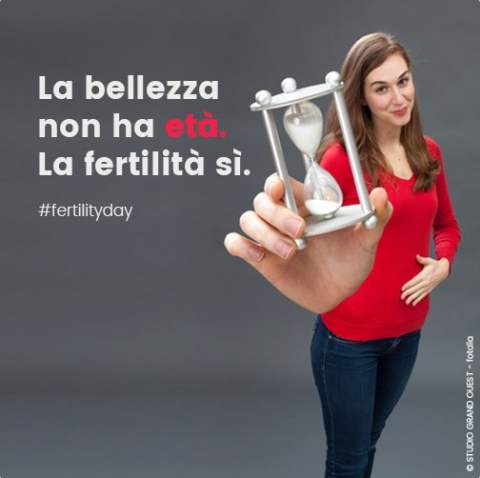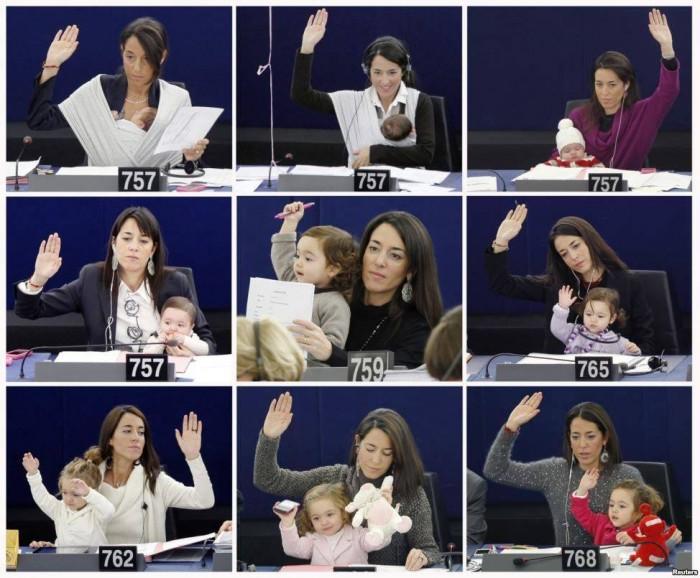
Italy's fertility day campaign
Italians are outraged
This article gives an extensive analysis of the controversial Fertility Day campaign that the Italian Minister of Health, Beatrice Lorenzin, launched on 22 September 2016. She established the Fertility Day in the Governmental agenda and decided to choose October as the month focused on reproductive health.
The goal of this institutional campaign is to counteract the low birthrate, that reached a historical high in 2015. (Istat, 2016a).
Raising awareness on such a relevant topic is more than justifiable. However, the social advertising campaign was so badly perceived, that the ministry of health had to shut down its website and withdraw the promotional posters within a couple of days. This was a consequence of the enormous amount of negative reactions that went viral on social media with the hashtag: #FertilityFake.
What was it about this campaign that made Italians, young and old, so outraged? Below, the most controversial aspects of the campaign will be analyzed.
The reason for the Fertility Day campaign
Initial complaints were addressed at the name of the campaign itself. Promoting procreation is something very different from caring about infertility issues, nonetheless the whole campaign uses the word fertility as if it were something Italians lack or are losing and that therefore should be safeguarded.

Fertility Day Banner
The campaign was announced on the institutional website www.fertilityday2016.it. The Minister of Health, Beatrice Lorenzin, explains the decision to start the campaign: "Fertility is a matter of health, 15% of Italian couples are visiting a doctor to find out if they have infertility issues, therefore this is a serious issue that has to be addressed both from a therapeutic and prevention point of view." Furthermore, she explains to whom the campaign is addressed: "Everybody, especially to youths who are not worried about reproductive health and should be informed about what can put it at risk. And then it is particularly addressed to those couples that have infertility issues or are afraid to be infertile."
The message conveyed by Minister Lorenzin and the fact that it's mostly women who are addressed through the poster campaign has caused her to not only lose focus on fertility issues, but also to discredit Italian women's fundamental achievements towards equality. These achievements have been hard-won during the Italian wave of feminism during the 70s. Major achievements, such as the legalization of divorce, the law that extended maternity leave for a period up to five months and the establishment of family clinics can all be traced back to the first half of the 70s. Furthermore, the Diritto alla famiglia (Family’s right) was reformed in 1975, making equal rights for men and women within the family a right protected by law. The right to abortion within three months from conception was eventually achieved in 1978. This was the first time women claimed the right to make decisions about their own bodies. Looking at the fertility day campaign, all of this could just as well never have happened.

Italian women holding the banner "Feminism" during a demonstration for women's rights in 1970s.

Italian women during a demonstration for women's rights in the 1970s. On the Banner: Women are fighting for Emancipation, Anti-Fascism, Democracy, Reforms
Controversy and misunderstanding were triggered already by the first message announcing the campaign. Italians and above all young Italians were questioning the necessity to set up a national campaign for a problem concerning 15% of couples, when there are other, more pressing, issues to be dealt with, such as the very high unemployment rate among Italian youths.
In 2015, Italian youth unemployment reached an all time low, with 42,3% of youths between 15-24 being without a job (Istat, 2016b).
Moreover, the campaign also sparked outrage, because Minister Lorenzin doesn't address any of the real issues that are at the root of the inability of beginning a familiy for most Italians. Even though fertility issues are very serious, they only cause a small portion of Italians to be unable to start a familiy. The majority of Italians suffer from the fact that Italy completely lacks a policy of subsidies to support and encourage young people towards an independent life, away from their parents.
The shocking reality is that in 2015, 67,3% of Italians between 18-34 were living with their parents (Eurostat, as cited in RaiNews, 2016).
A policy of subsidies is not what they are demanding. The demand of young Italians is simply the implementation of art. 4 of the Italian Constitution that guarantees the right to work. Sticking with this article, young Italians are demanding the right to be (self-)employed under conditions that would enable them to dare thinking of a future, and for some to make the dream of starting a family come true.

Fertility Fake
I am waiting to have an income! #FertilityFake One of the posters of demonstrators on September 22nd 2016.
What's in a name?
Another point that sparked major controversy is the choice of giving an English name to an Italian Government-made campaign. This choice provoked the outrage of many, among them Italian linguists, intellectuals and students. The critique uttered by these people was mainly focused on the fact that the campaign had nothing to do with foreign affairs, so the use of English was very out of place and inappropriate. The justification for this, given by Minister Lorenzin, was that English was used to catch the attention of young people, because fertility isn't a topic they usually find appealing. This implies that Italian isn't a catchy language to be used when addressing young Italians.
The choice of English for a campaign addressing Italians, who are well-known for the trouble they have with that language, sounded like a bad joke.
Students in particular found the English approach quite annoying. In Italian public schools, English is taught from a perspective which focuses mainly on the study of grammar and not so much on learning conversational skills. This has caused young Italians to be unable to compete as much as they would like with their international peers, within the hunt for international jobs. In addition, Italian students found the English approach even more annoying considering that Italian is the fourth most studied language in the world and that in October 2016 the Minister of Foreign Affairs launched a campaign to promote the study of Italian abroad.
The frustration felt by Italians with regards to the choice of English for this campaign can be illustrated with the following video of a speech, delivered by recently self-resigned Prime Minister Matteo Renzi, at Harvard University in april of this year. The speech is in English and subtitles have been added to it. The subtitles are not in Italian, as one might expect. Instead, they are a phonetic representation of the strong accent with which the Prime Minister speaks in English. The video, although very funny, is a strong example of the trouble Italians have with speaking in English.
To denounce this Anglicization of the Italian language, one of the most powerful reactions has been the creation of the Facebook hashtag #dilloInItaliano (#SayItInItalian) followed by an online petition on the matter.

#DilloInItaliano #SayItInItalian. The online petition to avoid anglicanisms in Italian Governmental campaigns.
Creating a feeling of guilt
Although Minister Lorenzin claims that the campaign addresses everybody, women are clearly the main target. Indeed, the first poster of the campaign was the one stating: “Beauty does not fade. Fertility does” accompanied by the image of a woman holding an hourglass in her raised hand. This one was the most controversial poster for women, because the message it conveyed was perceived as: your time is running out and it is all on you.
Outrage with regards to this campaign was also sparked by the fact that Minister Lorenzin herself only gave birth for the first time at age 43.
When questioned about her own procreation, the minister claimed to be part of the lucky 4% of the Italian women who are able to conceive naturally when they've passed the age of 40 and therefore women do not have to see her as a role model. The minister's claim was perceived as a slap to the face of all Italian women trying to procreate, although they might have passed the fertile age. This information is even more harmful considering the bad news about Valentina Milluzzo. Valentina was a 32-year-old aspiring mother, who managed to get pregnant with twins through fertility treatment. Valentina Milluzzo could be seen as a role model, according to Lorenzin's standards, being a woman who decides to start a family and to do so while she is still fertile. However, once Valentina Milluzzo and her husband realized they needed a fertility treatment, they did not hesitate to undergo one. This way she managed to get pregnant and to carry her pregnancy up to the fifth month, where things took a dramatic turn for the worst.
Valentina Milluzzo was already hospitalized for the delicate conditions under which her pregnancy developed. On the day she died, she was spontaneously aborting one of the twins she was pregnant with. Although she was in the place where help is given to people in need, Valentina did not receive it properly. In order to be helped, Valentina would have needed a medical intervention that might have compromised the development of the second twin. However, the male doctor in charge of her case refused to intervene, by appealing to his right of Conscientious Objection stating that he could have not intervene because it was against his religious belief. This caused Valentina's condition to quickly worsen and ultimately this led to her death, together with the deaths of both of the twins she was carrying.

"Beauty doesn't fade. Fertility does" The first poster launched by the minister of Health to promote the Fertility Day campaign.

Valentina Milluzzo and her husband before her death on the 19th of October 2016.
Disappointed Italian men and women took to the streets on September 22nd, to show their outrage about the Feritility Day Campaign.

The sign on the left hand side reads: “I took out the batteries from the biological clock and I put them in the vibrator. And you? #WhereDidYouPutThem?”
On the right hand side: “I took out the batteries from the biological clock and I put them in the megaphone. And you? #WhereDidYouPutThem? ”
Politicians are role models
Although minister Lorenzin did not want to be seen as a role model, many disagreed with this perspective because politicians represent and therefore reflect the country’s values. Therefore, especially politicians should be role models for the entire population. Moreover, politicians should be the first ones who abide the rules they preach. Luckily, good role models were provided by Italian members of the European Parliament even if the government lacked them. Among them, an outstanding example of what being a politician and a woman means, was given in 2010 by the brave Licia Ronzulli. Once she became a mum, she brought her newborn daughter to each session of the European Parliament, for a period of two years. Initially, she decided to do it for a short period to denounce the lack of spots available in the few Italian public nursery schools there are. Consequently, she persevered doing so, to give Italian women the example they were looking for and to show Italian men that parenting is not part-time and that maternity leave should be reconsidered. The most important voices in these matters are women's voices, as they want to be heard as well.

Licia Ronzulli of the European Parliament has been taking her daughter Vittoria to sessions for 2 years.
Italians united in outrage
The first Fertility Day campaign has been a total disaster. Not only did it fail to provide people who are dealing with infertility issues with useful information, but it also demeaned Italians and their language, as well as Italian women and the rights they've achieved for themselves. The Minister of Health responded to the enormous amount of negative critiques by shutting down the Fertility Day website and by withdrawing all posters as soon as the second day of the campaign. The nature of the campaign was later justified by the minister by stating that the intention of the campaign was to raise awareness on a serious issue and they chose a provocative approach to doing so. Ultimately, this first Fertility Day campaign sparked a positive and unexpected outcome as well: it woke Italians up and united them in their outrage.
References
Istat (2016a). National Institute for Statistics.
Fertility day Institutional video message
The hardly gained women's achievements Le dure conquiste delle donne.
Istat (2016b). National Institute for Statistics.
Eurostat (2016) retrieved from RaiNews.it